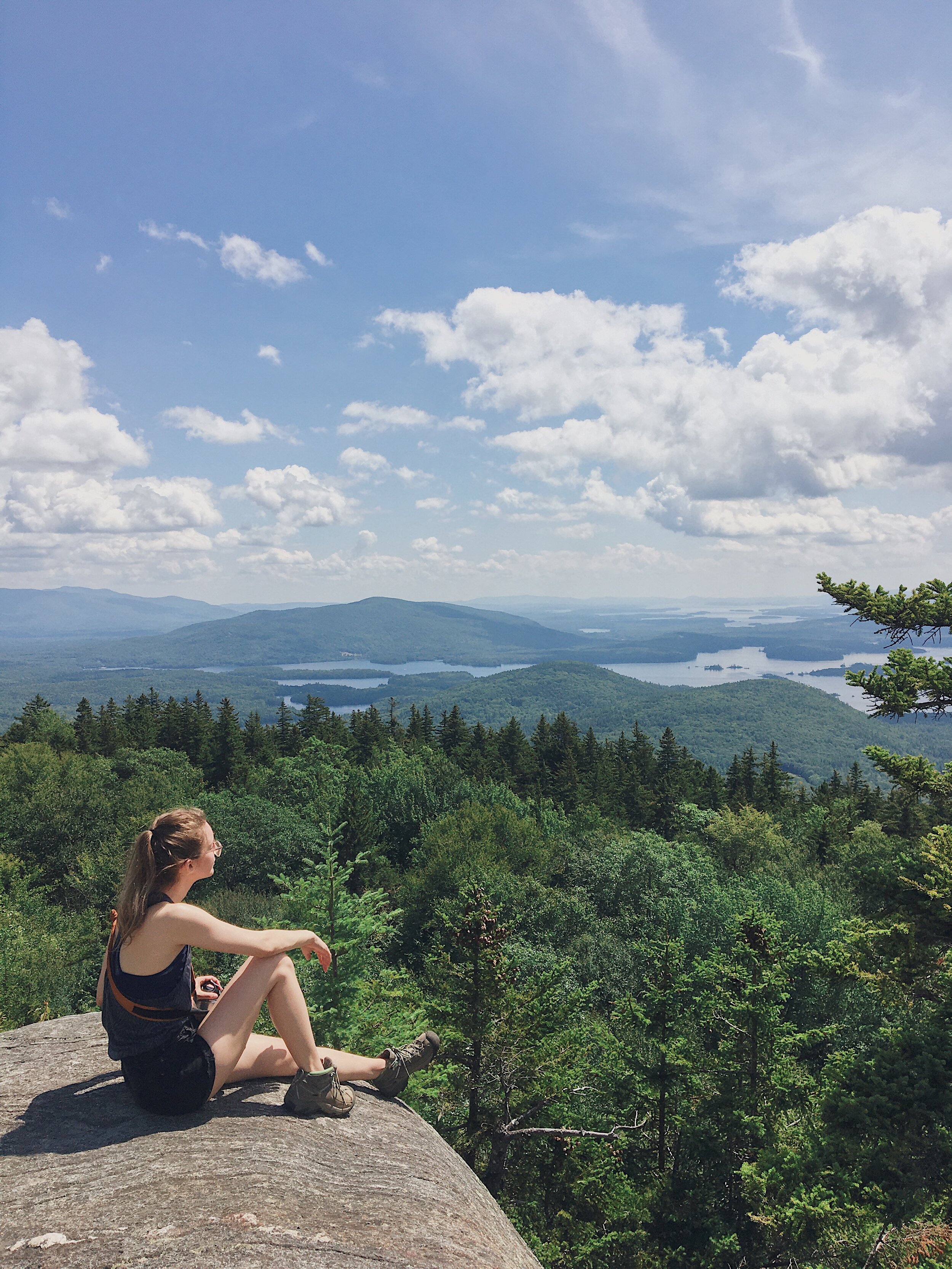Newton’s first law of motion says: an object will stay at rest unless pressed to change by an external force.
I think about this gasping for breath on a mountain trail at the heavy green height of August. After months of staying apartment-bound, it is the first time I have moved my body like this all year. The honest way it articulates in my head is, F**k, I have to do more cardio. The heat presses thick beneath the trees; it radiates off me when I stop to rest, an almost palpable haze rising from my skin. It’s torture and feeling alive at once.
Since I left for college, this strange tradition has formed: somehow, whenever my life reaches a crossroads, I always end up traipsing up a mountain with my father. Between gulps of water, he asks me things; he is better now at waiting to give advice until I ask. Our boots follow the well-worn trail, but our conversation meanders, cuts new ground like a bushwhacker.
There are things I tell him and things I don’t, and the things I hold back are always the truest ones. I don’t tell him that after half a year away from recording, dreaming of the glorious artistic fever of working, I instead found myself deadlocked, staring down the condenser like it was the barrel of a gun. I don’t tell him about my latest doctor’s appointment, and my fifth specialist referral in a year. I don’t tell him that despite his brisk assurances — You’ll bounce back, you always land on your feet — I don’t know if I will, this time.
Newton never defined “force” beyond the word itself, and that vagueness suits this year’s endless uncertainties. Force is a strange player onstage, forever changing faces. My father and I cross several of them on our breathless path. Sometimes it’s an excuse — when he pushes me to think of a step forward, and I point out that I’ve lost both my apartment and my job. Sometimes it’s heartening — when we talk about the conversations we’re seeing and learning to have around systemic racism, the commitment so many people are making. Sometimes it’s fear, primal threat — when we see someone coming down the trail toward us, maskless, and their eyes move slowly over the masks we quickly hook on.
We reach the summit in a little over an hour, and whatever existential thread we were pulling on pauses its unraveling. The deep drinkable green of summer pines unrolls like a map before us. Nearer the horizon the water glints bluely, thirsty promise. Everything they tell you about a landscape like this is true. The nervous cogs of my brain stop their grinding, confounded.
Here, force feels like the sun pressing its fingertips into my skin, the wind pushing the tops of trees aside. It feels like something inside my ribcage, indefinable, that propelled me two thousand feet up. I am nowhere but here, overheated and relieved and utterly small.
There is another way to think of Newton’s first law — one that refuses the vagueness of “force” — which is this: it is easier to maintain the state of something than to push it into movement.
It is easier to languish in perfectionist limbo than to bring a piece of work into being, however imperfectly.
It is easier to manage pain with a clear-cut answer for it than to be seeking that answer with the pain following, a nameless shadow.
It is easier to let this world’s violent structures stay put, to play the part of comfortable indifference, than to work to dismantle those violences and rebuild more caring frameworks in their place.
It is easier, in this material case of my body, not to climb a mountain than to put my lungs and joints and heart to work.
I used to be someone who started things and never finished them. Novel manuscripts, work projects, recipes, important conversations. I used to think that starting was the easy part. Now, I think I have been misjudging what actually constitutes a start.
Have I actually been pushed, or pushed anything, into motion? If there is no change — even a minuscule amount, even in my own mindset — has anything really begun?
“How do you feel?” my father asks as we prepare to leave the summit.
“Good,” I answer, despite the sweat coating every inch of skin, the ache in my bones. “I’m glad we did it.”
He inclines his head, I can’t tell if in thought or in a nod. “You wouldn’t have known you could otherwise.”
I don’t reply, and we sit there with the oxygen, the scorching sun, the reverence. It feels like he’s talking about something other than the mountain.
Parting notes—
Movement by Hozier — “You are a call to motion / There, all of you a verb in perfect view / Like Jonah on the ocean / When you move, I'm moved”
Vote.org makes it easy to register to vote, check your existing registration, choose your ballot, fill out a census form, and more. Get moving.
An explainer to Newton’s First Law of Motion by Professor Dave, if you’re curious.
